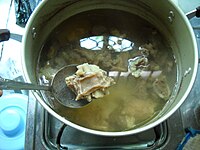Utilisateur:Utilisateur168221055/Brouillon/Renforce cette première révision
- Anglais: en:WP:BEEF

Les patrouilleurs des nouvelles pages sont souvent confrontés à des articles qui ne comptent que quelques dizaines de mots. Que doit-on alors penser de ceux? Il est presque impossible de déterminer le Wikipédia:État potentiel, non seulement actuel (en) d'un tel article. Les discussions à Wikipédia:Pages à supprimer souvent impliquent des auteurs en demandant un temps d'améliorer les articles aux autres participants à la discussion. On peut être d'accord ou pas concernant qui est la partie qui a la charge de la preuve dans cette lutte, mais espérons que cet essai illumine un certain point de vue un peu plus clairement.
Très courts ébauches[modifier | modifier le code]

Considére l'article exceptionnellement court suivant: « Le père de l'agriculture moderne. Ses efforts sauve plus d'un milliard de vies de la famine. »
La notorité est déclaré, mais qu'en est-il du contexte ? Comment peut-on en savoir plus sur cet individu ? Cela semble être le genre d'article pour lequel on a crée la critère A1 - Article sans sujet clair.
Et que penser de ceci:
« La chanseur qui est la plus populaire au Japon. »
Il semble que ce soit un cas auquel la critére A3 - Article sans contenu soit applicable. We know nothing about this person, except that she's a female Japanese singer. There are surely thousands of female Japanese singers that don't merit Wikipedia articles, even ones with uncited opinions of being "the most popular."
Un exemple de plus:
« Une société secrète basé au Georgia Institute of Technology à Atlanta, en Georgie. »
Il n'y a absolument aucune affirmation d'importance ici; un candidat incontestable pour l'A11 - Article ne répondant pas aux critères d'admissibilité. L'article pour Georgia Tech était existant et très substantif au moment de la publication de cet article, mais simple association avec un sujet notable ne confère pas la notabilité à un autre.
Identities and explanations[modifier | modifier le code]
Do you know what articles these are? All three have been eventually listed as featured articles.
The first is Norman Borlaug. Just a dozen revisions, in a few months' time, after that exceedingly humble beginning, the article more than quadrupled in size, contained a brief personal biography, multiple references, and better organization per the Manual of Style. That revision was still nothing compared to what the article would eventually become, but it was incredibly more substantive, and its potential infinitely easier to judge.
The second is Ayumi Hamasaki. The process was a little slower chronologically speaking in her case, but after eleven revisions, notability was asserted (though the article still lacked references), far more context was present, and so were suitable external links.
The third is ANAK Society. After just 13 hours of revisions, all done by the article's original author, it was more than thirty times this size, had a dozen references, seven section headers, copious wikilinks, and a picture. It was clearly still under construction (four of the section headers had no content under them), but no one would have ever considered nominating it for speedy deletion.
Application[modifier | modifier le code]
Though there was no incidence in any of these three cases of anyone proposing deletion or speedy deletion of these super-stubs, there very easily could have been. New page patrolling is a more widespread practice now, and there are users who check Special:NewPages frequently, looking to weed out articles unsuitable for inclusion in Wikipedia. The type of article that most catches the eye of new page patrollers as potentially unsuitable and needing to be checked is an exceedingly short stub. And it's with reason – often first revisions that are only a sentence or two in length are pure vandalism or self-promotion, two of the most obvious reasons for speedy deletion.
Even if an article isn't suitable for speedy deletion and goes on to survive its extreme infancy, a lack of actual content can be frustrating to editors participating in an articles for deletion discussion (AFD). Articles that at least assert potential notability and provide a small amount of context, but are still of questionable actual notability, are taken to AFD, where editors frequently ask for more time to add content than an AFD discussion typically affords. This request is not in itself unreasonable, but it could so easily be avoided.
If the editors who started these or any other articles with similar beginnings had simply written stronger, larger first revisions, all possible problems would have been avoided. There is no deadline, true, but the first interpretation of this statement is not invoked nearly as frequently as the second. Editors should take their time. This may be in the case of taking a little while typing into the once-blank box before publishing something written semi-extemporaneously. This may also be in revising and editing a draft in the userspace before putting that content into the mainspace.
Many users have lists on their userpages of the articles they've created. It's natural to want to document one's achievements, but in practice, many of the users that have numerous hundreds of articles in these lists created extremely short stubs such as the examples above and then gave them little to no further attention. There is no need to "scoop" anyone, certainly not a fellow user, and one can take equal (or more) pride in providing strong revisions to an article as they would in having their name on the first revision, particularly if they were a driving force in bringing the article up to good article or featured article status.
So beef up that first revision. There's really no reason not to, and doing so cures a lot of ills and potential ills.
See also[modifier | modifier le code]
